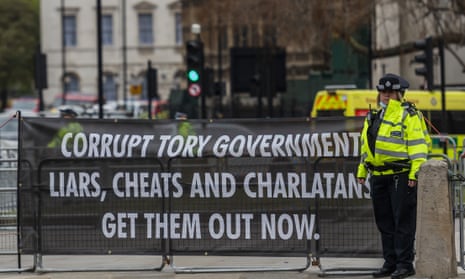The disgraceful Owen Paterson saga has provoked many articles, including Nesrine Malik’s, about the vulnerability of pillars of governance once imagined to be a deep part of British identity (I have lived under corrupt regimes – the cynicism stalking Britain is all too familiar, 8 November). Instead of thinking of these things as providentially ordained, there is hope to be found by recalling how they were made by ordinary hands.
Imagine that today all new judges were appointed by Dominic Raab. Yet, for us, the independent appointment of judges is quite new. It was wrested from the grip of the lord chancellor during the Blair government, and as a headhunter I played a part in that. (I led the search work to recruit the first Judicial Appointments Commission and, more significantly, its vital, little-remembered predecessor: the body which in a brief life blew apart the lord chancellor’s cosy club.)
When I started work in the civil service, I was taught that fundamental principles like appointment on merit, with no chumocracy, were created during the Crimean war. Our predecessors learned what the rule by cronies of the powerful had cost in terms of unnecessary deaths. They had had enough. They invented a new concept of public administration. They changed their minds about who, and what, deserved respect.
This “sceptred isle” needs a new Crimean moment. Let’s choose to have one.
Douglas Board
Visiting professor, University of Chichester
Nesrine Malik’s depiction of the way cynicism can flourish in a country like this is timely. The urgency now is around how to arrest the decline and restore voters’ belief that their participation at the ballot box is worthwhile. That only becomes possible if there is even the slightest belief that things are capable of changing.
And in the current mire, if opposition parties cannot even provide a spark of hope which might inspire us to believe that change is possible, then the direction of travel is bleak indeed. Robust and sustained calling-out of corrupt practices, corrupt individuals and, above all, demands for restitution where possible, are vital prerequisites if the rot is to be stopped.
Dr Peter Mangan
Beckenham, London
It is with sadness and shame that I concur with Nesrine Malik’s searing analysis. I once believed that my country, with all its failings and injustices, had endeavoured over the past 60 years or so to improve the lot of all through its commitment to the NHS, the welfare state and improving social justice. Once I believed that my government spoke with “good faith” and that it did at least intend to speak the truth. Once I believed that when I died, I would leave behind a better and fairer country than the one I entered in the 1940s.
Now I believe that this government, with its frequent reneging on explicit promises and agreements, its rejection of genuine honest debate, its distortion of facts, and our prime minister’s propensity to bully and flout every rule of good governance, is gradually unravelling the achievements of all the previous postwar administrations. If we continue on this path, it will inevitably lead to Britain being justifiably compared with Malik’s “failed states overseas”. What a sad and desperate state of affairs.
Peter Riddle
Wirksworth, Derbyshire
